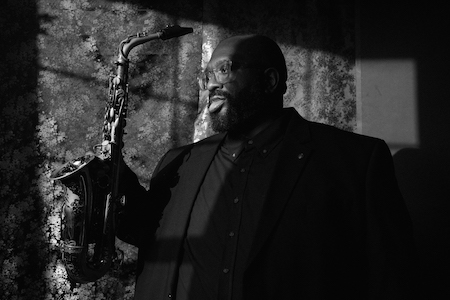Jan 13, 2026 2:09 PM
More Trump-Kennedy Center Cancellations
The fallout from the renaming of the John F. Kennedy Center for the Performing Arts to include President Donald…

Darius Jones returns with public-spirited determination.
(Photo: Ebru Yildiz)About five years ago, Darius Jones decided to take a break. At the time, the New York-based saxophonist found himself getting busier and busier, having recorded a series of ambitious albums that expressed their own blend of afrofuturism and swing.
Stepping away is part of the jazz tradition, especially in New York — like Sonny Rollins’ retreat to the Williamsburg Bridge 60 years ago. A recent result of Jones’ journey is the solo recording Raw Demoon Alchemy (A Lone Operation) on Northern Spy. During a conversation from his Brooklyn apartment, he was resolute about the “pause” that became the album.
“When you’re kind of wrapped up in all of it, you’re putting out records, doing all of those things, you can get lost in that cycle,” Jones said. “I wanted to be better and present something that was more true to myself and the only way I could get to that was to stop and to be courageous when I made my next statement as a leader.”
Jones’ trajectory was both communal and solitary. He toured by himself, performing as a soloist or collaborating onstage with musicians who live in different cities. Jones also composed for chamber and vocal ensembles. During the COVID lockdown, he listened to the recording of a Portland concert from his fall 2019 tour and used it for Raw Demoon Alchemy.
“Through that process, I got to to know what I like, confront fears, anxiety and all types of emotions that existed, and it was powerful,” Jones said. “There were moments when I was saying to myself, ‘This is annoying, but I like it. Give in to it.’ Also, when you play solo, you are not alone in the space; the space is giving you things. Silence is counterpoint.”
Jones added that collaborating with such leaders as drummer Mike Reed and bassist Eric Revis as well as the group Ceramic Dog encouraged him to pursue his voice through interpreting the compositions of others. Raw Demoon Alchemy consists of his takes on Roscoe Mitchell, Ornette Coleman and Sun Ra, a more recent piece by Georgia Anne Muldrow and the 1930s standard “Beautiful Love.” The album’s title honors the late rapper MF Doom, but Jones also referred to why he creates musical alter egos, such as the Demoon character. “It’s easier for me to embrace a character and let the music be that thing,” he said. “Demoon is the most beautiful character I’ve created, but he’s a villainous two-tongued individual. I’ve stolen these pieces — they’re mine now, not yours anymore.”
Since Jones’ 2009 debut as a leader, Man’ish Boy (A Raw And Beautiful Thing), his alto tone has echoed the lyricism of Johnny Hodges while carving out its own place in the free-jazz continuum. “I love just playing a melody and slightly embroidering it with playing over the bar line,” Jones said. “Or bending a note a certain way, or adding just the right note as an addition to the melody, or repeating something inside of the melody over and over again because it just touches me so deeply. It reminds me of being in church and getting so caught up in a sound, in a feeling.”
The involvement of Black churches in social justice causes also informs Jones’ composition “We Can Change The Country.” Darcy James Argue conducted the piece at Brooklyn’s Roulette on the eve of the 2020 election. The voices and instrumentalists respond to video clips connected to history and events that led to the Black Lives Matter movement. The track’s message is clear.
“What I’m trying to say is that in our society there’s an overseer, someone conducting things, moving things around, putting us in certain places,” Jones said. “During the performance, participants also made calls in real time and reminded people to vote.”
Similar public-spirited determination directs Jones’ role at the New School, where he’s been a part-time faculty member since 2018. “I’ve teared up at hearing a young musician blowing into their horn with so much meaning behind it,” he said of his experience working with jazz students. “That helped me to remember why I’m doing what I’m doing.” DB

Belá Fleck during an interview with Fredrika Whitfield on CNN.
Jan 13, 2026 2:09 PM
The fallout from the renaming of the John F. Kennedy Center for the Performing Arts to include President Donald…

Peplowski first came to prominence in legacy swing bands, including the final iteration of the Benny Goodman Orchestra, before beginning a solo career in the late 1980s.
Feb 3, 2026 12:10 AM
Ken Peplowski, a clarinetist and tenor saxophonist who straddled the worlds of traditional and modern jazz, died Feb. 2…

The success of Oregon’s first album, 1971’s Music Of Another Present Era, allowed Towner to establish a solo career.
Jan 19, 2026 5:02 PM
Ralph Towner, a guitarist and composer who blended multiple genres, including jazz — and throughout them all remained…

Rico’s Anti-Microbial Instrument Swab
Jan 19, 2026 2:48 PM
With this year’s NAMM Show right around the corner, we can look forward to plenty of new and innovative instruments…

Richie Beirach was particularly renowned for his approach to chromatic harmony, which he used to improvise reharmonizations of originals and standards.
Jan 27, 2026 11:19 AM
Richie Beirach, a pianist and composer who channeled a knowledge of modern classical music into his jazz practice,…